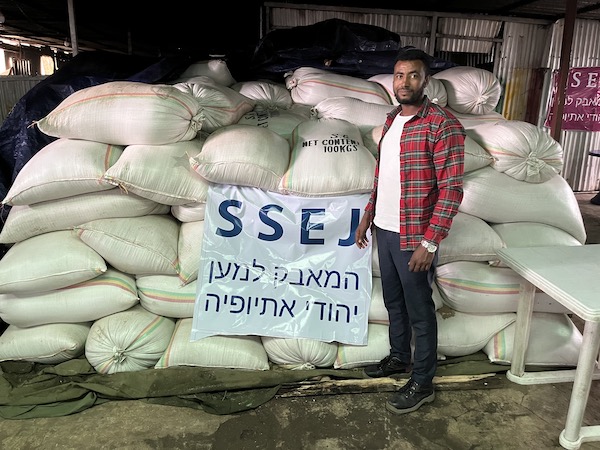With the economy in crisis in Gondar, aid groups are moving quickly to bolster food supplies to cover 1,500 Jewish households. (photo from SSEJ)
The ethnic violence that engulfed Ethiopia’s Tigray region in recent years is now gaining a foothold in the Amhara region to the south, home to Ethiopia’s largest Jewish community.
Although the Ethiopian government and the Tigray People’s Liberation Front militia signed a peace deal in November 2022, ethnic and political tensions continue to run deep, not only in Tigray, but in the Amhara region’s principal city, Gondar, where some 6,000 descendants and relatives of Israel’s Beta Israel community continue to wait for aliyah. More than 600,000 people died during the two-year Tigray civil war. As many as half of those casualties, investigators say, were civilians whose deaths could have been prevented if adequate food stocks and humanitarian aid had been available. That fact has helped coalesce efforts by aid groups to bolster food supplies for Gondar’s Jewish community. But, as those aid organizations are finding, building the resources needed during an ongoing political conflict is difficult.
Last month, after Amhara’s local militia Fano took control of parts of the region, fighting broke out in Gondar that resulted in several days of gun battles, some within proximity of the Jewish community and synagogue. Government forces eventually retook the city, but not without casualties. At least one member of the Jewish community was killed.
As part of the government’s ongoing effort to subdue rebel forces, it declared a six-month state of emergency Aug. 4, including nightly curfews in Gondar. Businesses were forced to shutter during the fighting, and most have still not been able to reopen.
Avi Bram, co-founder for the British nonprofit, Meketa UK, which provides microloans for small businesses and other programs designed to increase economic self-sufficiency in the Jewish community, said the fighting made it unsafe for community members (and others) to leave their houses during the first two weeks, even to find food and water. Most residents in the Jewish quarter don’t have modern amenities in their homes like electricity, running water and refrigerators, he noted.
Bram said the biggest challenge right now is to guarantee residents have food. “Most houses have completely run out,” said Bram, “and it’s still very expensive to buy [supplies] at the moment in Gondar.”
Although some businesses like banks and grocery stores are now open, fighting in the outer areas of Amhara has disrupted supply chains from the capital. It’s also caused food prices to skyrocket. “So, we’re fundraising now,” Bram said.
Both Meketa UK and its North American partner, Meketa USA, which handles fundraising and educational programs in the United States and Canada, are reaching out to their donors and the general public for help. The plan is to build up basic food supplies so families don’t starve during the state of emergency. Bram said he expects the city’s economic recovery will take many months.
Two weeks ago, aid workers purchased the first large shipment of grain, oil and chickpea paste for the community. Volunteers began distributing the stocks to as many of the 1,500 homes as possible. Bram said they plan to repeat the process as more funds become available.
Like Meketa, the U.S.-based Struggle to Save Ethiopian Jewry (SSEJ) is racing to fortify its food stocks and medical supplies for the Gondar community. SSEJ is the largest humanitarian aid organization supporting Jewish descendants in Ethiopia, serving 5,000 meals a day to residents and providing a variety of medical and social services for those in need. Yet, SSEJ president Jeremy Feit admitted they are struggling right now to keep up with the increasing demand for food and support brought on by the conflict. “We continue to do what we can although we don’t have nearly enough funding,” he said.
SSEJ provides feeding programs for undernourished children, and pregnant and nursing mothers; supplemental education programs for school-age children; and a new pediatric clinic. It partners with Israeli nonprofit Operation Ethiopia, which runs an eye clinic staffed by Israeli specialists.
Feit said SSEJ hopes to work around supply chain problems by ordering food stocks from the United States and from other parts of Ethiopia. But that takes money and time. “We are also trying to get medical supplies in to service the larger Gondar area, Jewish and non-Jewish alike,” he said.
High Holy Day meals and foods are another significant demand, assisted each year by the North American Conference for Ethiopian Jewry.
With the military now visible in Gondar, Meketa co-founder Hila Bram said the sounds of gunfire are more distant. “There are a lot of government soldiers around – everyone is afraid, but the soldiers around makes it feel there is control.” But not all of the Jewish community lives within city limits. “Many of the poorest families live in Belajek, which is an area outside the main city road, because it is cheaper there,” she said, adding that those residents still sleep with the presence of gunfire nearby.
Aid workers know that, even if the fighting ended tomorrow, it will likely be many months before economic stability is restored and everyone can return to work. While residents wait hopefully for an airlift to Israel, aid agencies are already planning the next emergency food shipments to tide them through winter.
For more information about Meketa UK/USA (meketausa.org), Struggle to Save Ethiopian Jewry (ssej.org), Operation Ethiopia (operationethiopia.com) and North American Conference on Ethiopian Jewry (nacoej.org) and how you can assist, visit their websites.
Jan Lee is an award-winning editorial writer whose articles and op-eds have been published in B’nai B’rith Magazine, Voices of Conservative and Masorti Judaism and Baltimore Jewish Times, as well as a number of business, environmental and travel publications. Her blog can be found at multiculturaljew.polestarpassages.com.

